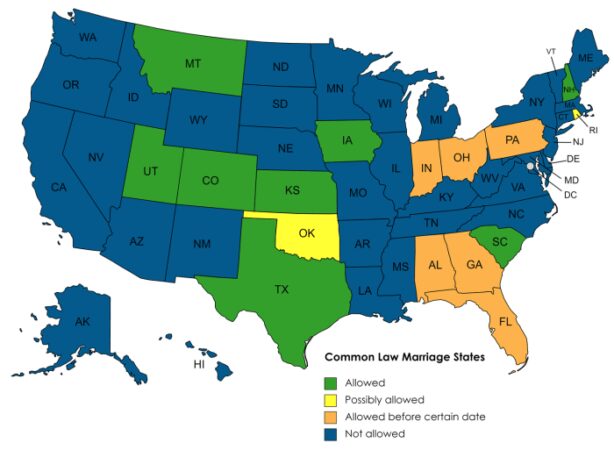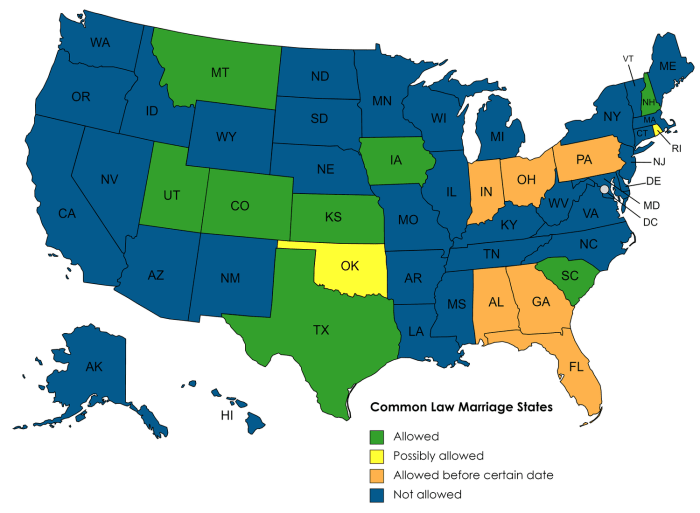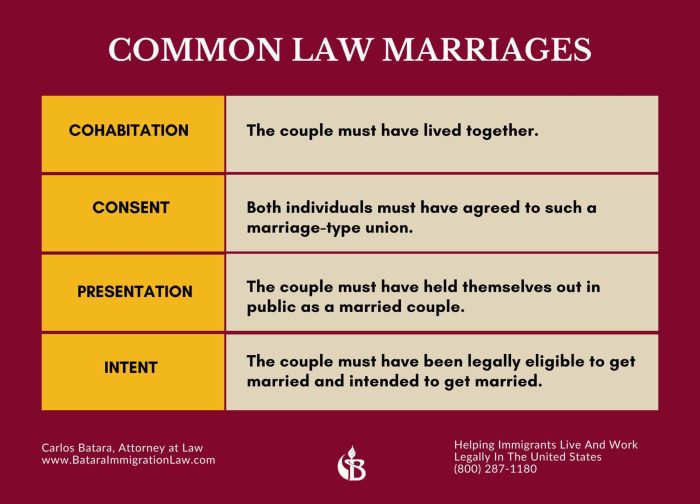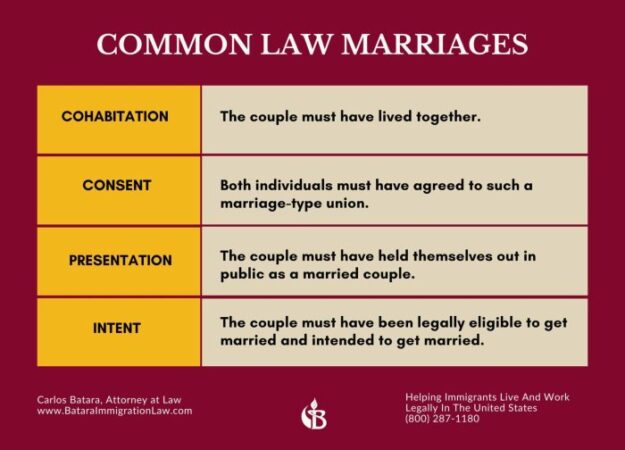
Does Florida recognize common law marriage? This question has intrigued many, as the Sunshine State holds a unique stance on this legal concept. While common law marriage is recognized in some parts of the United States, Florida has a long history of rejecting it, leading to a complex legal landscape for couples who believe they are in such a relationship.
This article delves into the intricacies of Florida’s legal position on common law marriage, exploring its historical context, the arguments for and against recognition, and the potential legal consequences for those who believe they are in a common law marriage. We’ll also discuss the requirements for establishing a common law marriage, the legal implications of such a relationship, and the process of termination.
What is Common Law Marriage?

Common law marriage, also known as informal marriage, is a legal recognition of a couple’s relationship as married, even though they haven’t gone through a formal marriage ceremony. It’s a legal concept that exists in certain states, allowing couples who meet specific requirements to be considered legally married without obtaining a marriage license or having a formal ceremony.
Key Characteristics of Common Law Marriage
The requirements for establishing a common law marriage vary by state, but generally include the following:
- Presentation to the public as married: The couple must present themselves to the public as married, meaning they hold themselves out as a married couple to family, friends, and the community. This can include using the same last name, sharing a residence, and referring to each other as husband and wife.
- Intent to marry: The couple must intend to be married, meaning they have a genuine belief and commitment to being married. This intent must be present at the time they begin living together as a couple.
- Cohabitation as husband and wife: The couple must live together as husband and wife. This means they share a residence, engage in marital activities, and hold themselves out as a married couple.
Historical Context and Origin of Common Law Marriage
Common law marriage originated in England during the Middle Ages when formal marriage ceremonies were not always accessible or required. It was a way for couples to establish their relationship as legally binding without the need for a formal religious or civil ceremony. In the early American colonies, common law marriage was widely recognized as a valid form of marriage.
Common Law Marriage vs. Traditional Marriage
- Formal Ceremony: Traditional marriage requires a formal ceremony officiated by a religious or civil authority, while common law marriage does not.
- Legal Recognition: Traditional marriage is recognized in all states, while common law marriage is only recognized in certain states.
- Requirements: Traditional marriage has specific legal requirements, such as obtaining a marriage license and fulfilling residency requirements. Common law marriage requires specific criteria, such as public presentation as married, intent to marry, and cohabitation.
Florida’s Stance on Common Law Marriage: Does Florida Recognize Common Law Marriage

Florida does not recognize common law marriage. This means that couples who live together and present themselves as married, even if they have not obtained a marriage license or had a formal ceremony, are not considered legally married in the state of Florida.
Historical Context
Florida’s stance on common law marriage has evolved over time. The state initially recognized common law marriages, but in 1968, the Florida legislature abolished the recognition of common law marriages for couples who entered into a relationship after January 1, 1968. This change was enacted to prevent fraud and clarify the legal status of relationships.
Arguments for and Against Recognizing Common Law Marriage
The decision to abolish common law marriage in Florida has been the subject of debate, with arguments both for and against its recognition.
Arguments for Recognition
- Presumption of Marriage: Proponents argue that common law marriage allows for a presumption of marriage, which can be beneficial in situations where a couple has lived together for a long period and held themselves out as married, but may not have a formal marriage certificate. This can be helpful for purposes of inheritance, property rights, and other legal matters.
- Protection for Children: Recognizing common law marriage can provide legal protection for children born to unmarried couples. In the absence of a formal marriage, children may face uncertainty regarding their legal status and parental rights.
- Equal Treatment: Supporters of common law marriage argue that it promotes equal treatment for all couples, regardless of their marital status. They believe that couples who choose to live together and present themselves as married should have the same legal rights and protections as formally married couples.
Arguments Against Recognition
- Fraud and Misrepresentation: Opponents argue that common law marriage is susceptible to fraud and misrepresentation, as it can be difficult to prove the intent of the parties to be married. This can lead to disputes and legal challenges.
- Uncertainty and Legal Disputes: The lack of a formal marriage certificate can create uncertainty about the legal status of a relationship and can lead to disputes regarding property division, inheritance, and other legal matters.
- Public Policy Concerns: Some argue that recognizing common law marriage undermines the institution of marriage and the public policy of encouraging formal marriage.
Legal Consequences of Common Law Marriage in Florida
While Florida does not recognize common law marriage, it’s crucial to understand the legal implications that can arise if a couple presents themselves as married, even without a formal ceremony. This section explores the potential legal consequences of such relationships, including property division, spousal support, and inheritance rights.
Property Division
If a couple presents themselves as married, the court might consider their relationship as a common law marriage for the purpose of dividing property. This is especially relevant if the couple has been living together for an extended period, held themselves out as married to the public, and shared finances. In such cases, the court might apply the same principles of equitable distribution used in traditional divorces, where marital assets are divided fairly between the parties.
For example, if a couple has been living together for 10 years, holding themselves out as married, and shared finances, a court might consider their relationship as a common law marriage and divide their assets accordingly.
Spousal Support
In Florida, spousal support, also known as alimony, is awarded to a financially dependent spouse after a divorce. While Florida doesn’t recognize common law marriage, a court might consider a couple’s relationship as a common law marriage for the purpose of awarding spousal support. This decision will depend on the specific circumstances of the case, including the length of the relationship, the financial contributions of each party, and the need for support.
For example, if a couple has been living together for 15 years and one spouse has been financially dependent on the other, a court might consider their relationship as a common law marriage and award spousal support to the dependent spouse.
Inheritance Rights
Florida law does not automatically confer inheritance rights on a partner in a common law marriage. However, if a couple presents themselves as married, the deceased partner’s will or estate might include provisions for the surviving partner. This could include inheritance of property or other assets.
For example, if a couple has been living together for 20 years, holding themselves out as married, and the deceased partner’s will includes provisions for the surviving partner, the court might consider their relationship as a common law marriage and uphold the will’s provisions.
Termination of Common Law Marriage in Florida

While Florida doesn’t officially recognize common law marriage, if a couple presents themselves as married and the court recognizes their relationship as a common law marriage, ending this relationship requires a formal legal process. This is because, although Florida does not recognize common law marriages, it can recognize them if the relationship meets certain criteria.
Dissolution of Common Law Marriage
A common law marriage in Florida can be legally terminated through a process similar to divorce, called “dissolution.” This process involves filing a petition for dissolution with the court, outlining the reasons for ending the relationship. The court will then adjudicate the matter, considering factors like property division, alimony, and child custody.
Implications of Ending a Common Law Marriage Without Formal Dissolution
Ending a common law marriage without a formal dissolution can have significant legal consequences. This includes:
- Property Division: Without a formal dissolution, the parties may face challenges in dividing their assets, potentially leading to disputes and legal battles. This can be especially complex when dealing with property acquired during the relationship.
- Alimony: A court may not grant alimony to a former common law spouse without a formal dissolution, as it’s difficult to prove the legal existence of the marriage without a court order.
- Child Custody and Support: While a court can still address child custody and support even without a formal dissolution, the lack of legal recognition of the marriage can complicate the process.
Legal Issues and Considerations
While common law marriage can be a valid way to establish a legal relationship in Florida, it is essential to be aware of the potential legal issues that can arise. The lack of formal documentation and the complex nature of proving a common law marriage can lead to disputes and challenges, particularly in situations involving property division, inheritance, or child custody.
Challenges to the Validity of Common Law Marriage
The validity of a common law marriage can be challenged in various situations. This often occurs when one party denies the existence of the relationship or when there are conflicting accounts of the elements required to establish a common law marriage. Here are some common scenarios where challenges might arise:
- One party disputes the existence of the relationship: One partner may deny ever intending to be married, or claim that the relationship was not presented to the public as a marriage.
- Lack of clear evidence: If there is insufficient evidence to prove that the couple held themselves out to the public as married, such as shared finances, joint property ownership, or shared living arrangements, the validity of the common law marriage could be questioned.
- Prior marriage: If one party was previously married and the divorce was not finalized, a common law marriage may be deemed invalid.
- Fraud or misrepresentation: If one party entered into the relationship under false pretenses or with the intent to deceive the other, the validity of the common law marriage may be challenged.
Seeking Legal Advice, Does florida recognize common law marriage
Navigating the complexities of common law marriage in Florida can be challenging. Seeking legal advice from an experienced family law attorney is crucial in situations involving:
- Establishing a common law marriage: An attorney can guide you through the process of proving the elements required to establish a valid common law marriage.
- Challenging the validity of a common law marriage: If you are facing a situation where the validity of a common law marriage is in question, an attorney can represent your interests and provide legal counsel.
- Property division and inheritance: An attorney can help you understand your rights and obligations regarding property division and inheritance in the context of a common law marriage.
- Child custody and support: In situations involving children, an attorney can assist with issues related to child custody, visitation, and support arrangements.
It is essential to remember that common law marriage is a complex legal issue, and seeking legal advice from a qualified attorney can help you navigate the challenges and protect your rights.
End of Discussion
Navigating the complexities of common law marriage in Florida requires careful consideration and, ideally, legal guidance. While the state does not officially recognize common law marriage, understanding the legal arguments and potential consequences is crucial for those who believe they are in such a relationship. By seeking legal advice from an attorney experienced in family law, individuals can gain clarity and protect their legal rights.
Expert Answers
Can I get married in Florida without a license?
No, Florida requires a marriage license for all marriages, including common law marriages.
What if I’ve been living with someone for years and we believe we’re common law married?
While Florida does not recognize common law marriage, it’s essential to consult with an attorney to understand your legal rights and obligations.
If Florida doesn’t recognize common law marriage, why is it a topic of discussion?
Understanding the historical context and legal arguments surrounding common law marriage is important, even if it’s not recognized in Florida, as it can impact legal situations involving property, inheritance, and other legal issues.





